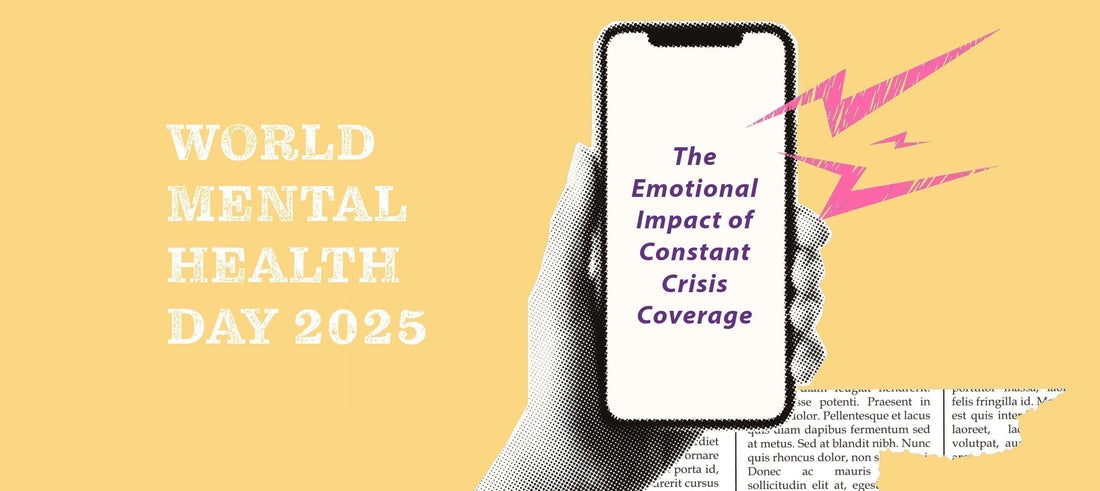
World Mental Health Day 2025
The emotional impact of constant crisis coverage
World Mental Health Day, and indeed every day, serves as a powerful reminder of the importance of caring for our mental and emotional well-being. This year’s theme Access to Services: Mental Health in Catastrophes and Emergencies, highlights the need for ensuring mental health support is available for those affected by disasters, war, conflict, and displacement. As global humanitarian needs continue to rise, this has never been more critical.
As well as establishing mental health support for those affect by crisis, this also shines light on another increasingly pressing aspect: the mental health impact of repeated exposure to news coverage of crises and conflicts.
From natural disasters, to wars, political unrest, and humanitarian emergencies, today’s 24-hour news cycle means that young people are constantly surrounded by distressing images and information. While it is important to stay informed, repeated exposure to traumatic news can heighten feelings of anxiety, sadness and helplessness. For many young people, this constant stream can lead to feelings of overwhelm and emotional fatigue. It's important to be aware of this and take steps to protect young people's mental health.
Supporting students affected by crisis and conflict
Supporting students affected by crisis and conflict with their mental health begins with creating a safe and supportive environment. Schools should offer consistency, calm, and clear routines to help students feel secure. A sense of safety is foundational for healing and learning, especially for those who have experienced trauma. Alongside this, it’s vital to ensure students have access to mental health support, whether through school counsellors, psychologists, or trusted external services. Making these resources visible and approachable helps normalise seeking help and encourages students to reach out when they need it.
Building a sense of belonging is equally important. Positive relationships with peers and adults, inclusive classroom practices, and group activities can help students feel connected and supported. Teaching coping skills such as mindfulness, journaling, or creative expression can empower students to manage stress and build resilience. It’s also essential to respect and support students’ cultural and linguistic backgrounds, providing materials in their native language when possible and celebrating diversity.
Understanding their experiences and maintaining consistent communication between home and school can also build a holistic and effective approach to mental health care. Collaborating with families and communities strengthens the support network around each student.
Supporting students in understanding the news
Helping young people understand the news starts with open conversations and encouraging them to share what they’ve seen and how it makes them feel. Breaking down complex topics into simpler terms and connecting them to everyday experiences can make the news more relatable and less overwhelming.
Asking questions like 'What do you think about that story?' and 'How did what you saw make you feel? can help them to process information and support their emotional responses, validating feelings of confusion, sadness, or worry, and helping them focus on what they can control, or steps they can take like learning more or taking small actions to help others.
Encouraging healthy media habits
We can support student to grow healthy media habits by helping them develop a healthy balance in their media consumption, between staying informed and protecting their mental health. Teaching teens to set screen time limits, how time on devices makes them feel, and recognise when it is time to take a break from news and social media, as well as what habits they can put in place as alternatives to doomscrolling and overwhelm, can all be brilliant tools they can rely on.
Equally encouraging mindfulness, self-care and empathy within these discussions can also empower students to cope better with distressing events in the world around them.
Adults can model thoughtful engagement by sharing how they process news themselves and why it’s okay to step back when things feel too heavy, as well as what habits they have in place to help support their mental health.
The role of PSHE
Teachers play a crucial role in helping students navigate the complex media landscape. Through PSHE education, pupils can learn to critically engage with what they see and hear, build emotional resilience, and understand that it's important to take regular breaks and take care of their mental health.
According to the Coalition on Youth Mental Health in Schools, made up of leading multi-academy trusts and independent schools, PSHE education can have a direct positive effect on young people’s mental well-being. Their 2021 inquiry report found that “PSHE education can improve a student’s physical and psychosocial well-being, in turn improving academic outcomes.”* This highlights just how essential it is to give mental health education the time and attention it deserves.
In PSHE lessons, teaching media literacy is a vital way for young people to learn healthy habits around media. Learning how to spot reliable sources vs misinformation, understanding bias, opinion, and perspective in reporting, discussions around healthy media consumption, and how to seek support if what they are seeing online is affecting them emotionally, are all key tools to becoming more resilient, and media savvy.
Helping young people understand their emotional responses to the world around them is one of the most powerful tools we can give them. On World Mental Health Day and beyond, let’s continue to make mental health education a priority in every classroom.
Where to find support
Issues Online
Explore our resources at Issues Online here:
Mental Health Services and Helplines
Samaritans Helpline - Call 116 123
Open 24hrs a day, 365 days a year
